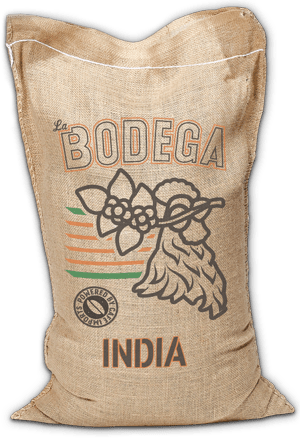India – Microlot – Ratnagiri Estate – Catuai – Carbonic – Washed B21002
Specs:

Source:
India
Region:
Karnataka
Farm:
Ratnagiri Estate
Variety:
Catuai
Altitude:
1355 MASL
Processing:
Natural
Notes:
"Mild almond, fruit, and malt flavors. Tart citric acidity and mellow fruit-like sweetness."
Score:
Price/Bag:
$6.84 per lb
$301.00 per bagOut of stock
Background:
Microlot
Cafe Imports began sourcing coffee in India 25 years ago, importing Monsoon Malabars. We appreciated the chocolate, earth, and spice notes that anchor a traditional espresso. As the specialty industry developed, we began consciously sampling more microlot and Plantation A coffees from India, importing select offerings. Without a steady source, though, we haven't been able to source on the ground in India, though the motivation to find quality India offerings has always been present in the team. At the Boston SCA Expo in 2022, we met Ashok Patre of Ratnagiri Estate and eventually received samples from him. Ratnagiri coffees are diverse in varieties and processes, proving India's potential quality in our lab cuppings. The next step for Cafe Imports is to visit India, meet more producers, cup more samples, and uncover the specialty coffees that await in this beautiful country.
Ratnagiri Estate
The Western Ghats, or Sahyadri mountain range run parallel to the west coast of India, reaching into the Karnataka State. Westerly monsoon winds carry dense rain clouds that break on the intercepting mountain range, sustaining the rainforest's flora, fauna, and wildlife. Ratnagiri Estate is situated in the southwestern Ghat's foothills, where the mountain meets the Deccan Plateau near Bababudangiri, the birthplace of coffee production in India. This abundant mountainside is canopied by silver oak trees, shading the coffee that’s been grown below for generations. The Patre family founded Ratnagiri Estate in 1927, and Ashok Patre assumed ownership in 1989. Since then, Ashok has revolutionized coffee production on his farm and in India.
India may not be well-known for its specialty coffee production, but in recent years, we’ve been consciously sampling more coffee from here in search of a source to introduce India microlots to our offerings. We met Ashok Patre a few times and finally sampled his coffees in early 2023. Using our cupping form, The Coffee Rose, the quality of the offerings was evident. As Ashok told us, “Slowly, we were successful because the coffee spoke for itself… It was a long journey, but well worth it because we were able to showcase that even India can produce some really good specialty coffees. We are proud to offer these coffees today.
Converting from a traditional coffee farm to a specialty-focused operation is a risk, especially within a country where nearly 75% of the coffee produced is Robusta. After taking over the farm in 1989, Ashok only practiced washed processing like his family before him. In 2010, though, he noticed the single-origin trend in cafes and the industry’s push for higher-quality offerings. In 2016, Ashok produced his first honey-processed coffees and slowly started adapting production toward specialty to meet this demand. The risk in this change was finding customers, but the reward was surviving the rising cost of inputs and labor and the pressure of climate change. Year by year, Ashok reevaluated all aspects of production. He began with cherries by implementing more selective picking over five to six rounds, followed by intensive sorting before processing. “We feel that is most important in Specialty to start with.” He then invested in infrastructure by constructing a mill, drying houses, and a washing station outfitted with fermenters.
Today, every aspect of production and process is controlled at Ratnagiri Estate, and 60% of the 117-hectare farm’s volume is Specialty grade. Ashok is focused on eco-friendly farming – “The only thing we use is fertilizers, and in case we have a pest attack, it is always biological control… I have seen a lot of farms all over the world [who] by indiscriminate use of pesticides and herbicides…ruin their farms.” Varieties grown at Ratnagiri include Catuai, Catimore, Cauvery, SL-9, and Hemavathi intercropped with fine pepper. In processing, many unique modulations of washed, carbonic maceration naturals, anaerobic naturals, yeast-fermented naturals, aerobic fermented honeys, and their signature carbonic macerated washed are applied to individual varieties from specific farm subplots.
Ashok’s intention is to showcase India in a new form, and Ratnagiri Estate coffees do. We are grateful that Mr. Patre’s interest in specialty coffee was sparked over 10 years ago and that these offerings have reached our warehouse. As Cafe Imports sources throughout more regions, we find ourselves walking through farms that, in previous years, would not have been considered a specialty source. The forward-thinking producer, though, challenges the industry’s conception of what good coffee is and where it comes from, changing the landscape. Ashok is emblematic of this new era in coffee.
Recommendations
-

Bolivia – FTO La Paz – La Cooperativa Corpus Cristhy Illampu R.L – Red Catuai & Typica – FLO ID 3645
$ 5.14 per lb Add to cart -

Brazil – Organic Cascara – Cascara Tea – Espirito Santo – Fazenda Camocim – Biodynamic
$ 15.87 per lb Add to cart -

Burundi – Microlot – Gakenke – Kayanza – Washed
$ 6.05 per lb Add to cart -

Colombia – Decaf Origin Select – EA Decaf de Cana – Huila
$ 5.27 per lb Add to cart


































